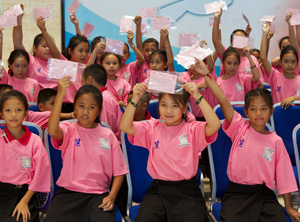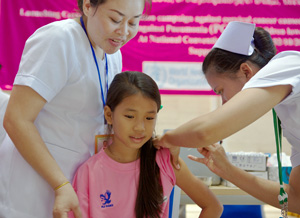Vaccines recently introduced in Indonesia and Laos will help protect millions of people from a range of diseases.
With support from the GAVI Alliance–a public–private global health partnership–Laos is the first South East Asian nation to introduce pneumococcal vaccine and begin a demonstration project for the human papillomavirus (HPV) vaccine.
This will tackle two major killers of children and women respectively–pneumococcal disease (pneumonia) and cervical cancer. About 180,000 infants will receive the pneumococcal conjugate vaccine and 13,000 girls will receive the HPV vaccine in the next year.
Indonesia has introduced a pentavalent vaccine to prevent five common diseases–diphtheria, whooping cough, tetanus, hepatitis B and Haemophilius influenzae type b (Hib)–with one injection.
The vaccines are being rolled out in both countries through GAVI with Australian support.
Immunisation is one of the most effective public health interventions and has a key role in reducing child mortality worldwide. As a funding mechanism to support immunisation and stronger health systems, GAVI plays a key role in negotiating lower vaccine prices for developing countries.
President of the National Assembly, Ms Pany Yathothou, led the launch of the vaccines in Laos. She emphasised the importance of immunisation to avoid disease and underpin socioeconomic development. Helen Evans, Deputy CEO of GAVI, praised Laos' commitment to immunisation in terms of coverage and introducing new vaccines. She thanked Australia, among several core donors, for its support to GAVI. Ambassador Lynda Worthaisong represented Australia at the launch.
In Indonesia, the pentavalent vaccine was launched by Indonesia's Minister of Health, Dr Nafsiah M'boi, with Helen Evans and James Gilling, the head of the Australian aid program in Indonesia and Australian Ambassador for HIV/AIDS, Tuberculosis and Malaria.
Mr Gilling commended GAVI's work in market-shaping and securing record price reductions for the pentavalent vaccine and others. 'The introduction of the pentavalent vaccine in Indonesia is a good example of an effective private–public partnership to improve the health of communities in developing countries,' Mr Gilling said.
Indonesia is self-procuring the pentavalent vaccine through its state-owned pharmaceutical company, Bio Farma. Indonesia is one of two countries in the region that has self-procured vaccines. Bio Farma is also collaborating with the Murdoch Children's Research Institute in Melbourne and Universitas Gadjah Mada in Yogyakarta to develop a vaccine against rotavirus, the leading cause of severe diahorrea among infants and young children.


